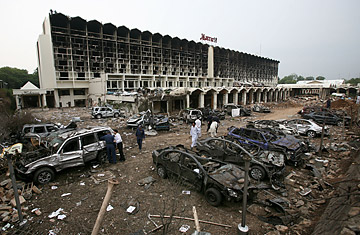
Pakistani security guards and employees walk among the wreckage of the devasted Marriott Hotel in Islamabad.
The attack on the Marriott Hotel in Islamabad should tell us a couple of things: For a start, no one and nothing is safe from a car bomb. Or, as in the Marriott's case, a truck bomb. As hotels go, the Marriott was a fortress. It had fairly good "standoff" — the distance between it and the street; luggage and guests were X-rayed before entering; the hotel was located in one of the best policed capitals in the world. The only thing that could have been done to make the Marriott even safer was to have completely shut down Islamabad's traffic — something obviously not practical. Pakistan is as dependent on the internal combustion engine as any other city.
Pakistan's new president Asif Zardari was supposed to have been dining at the Marriott when the bomb went off, but had decided at the last minute to eat at the prime minister's house. Had he kept to his original dinner plans, he could very well have been killed, pushing Pakistan closer to total and uncontainable chaos. By the way, there is a fairly good argument that car bombs are what keep the world's leaders from getting out and walking around, leaving them physically isolated.
In an address to the Los Angeles World Affairs Council last week, CIA Director Michael Hayden said that al Qaeda's obtaining a nuclear weapon is the CIA's deepest fear. While he was right in the sense that bin Laden potentially could again kill thousands of Americans, it's a worst case terrorist scenario and not the most likely one. The Marriott bombing reminded us once again that it is the common, everyday weapon we should be most afraid of. The 9/11 hijackers took over four airplanes with box cutters.
Earlier this year, for a British documentary, I spent a month traveling around the Middle East and Europe interviewing car bombers, collectively some of the greatest mass murderers of the 20th century. What I came away with is the certainty that the car bomb in unstoppable. It is detectable only if every car moving around a city is stopped and inspected, which obviously can't be done.
And car bombs can change the course of history. Many believe that the IRA's 1993 truck bomb attack in in Bishopsgate, the center of London's financial district, helped convince Britain to seek a political settlement with the IRA. In 2005, a former Lebanese prime minister in 2005 was killed by a car bomb that provoked a cascade of events that led to Hizballah becoming the de facto sovereign authority in Lebanon. Or, on a happier side, the sharp drop off in car-bombs in Iraq has averted a civil war. And the Oklahoma City truck bombing effectively destroyed the right wing insurgency Tim McVeigh wanted to rally.
No doubt al-Qaeda will be blamed for the Marriott attack, with the implication that only an experienced terrorist group could have carried it out. But just about anyone can make a car bomb. Designs are available are on the Internet. Karl Armstrong, the man who blew up a University of Wisconsin building in 1970, found the formula for his fertilizer car bomb in the Encyclopedia Britannica.
Whatever the fall out is from the Marriott bombing, it may be a nuclear bomb in the hands of terrorists that keeps the CIA awake at night, but it should be that eighteen-wheeler truck that doesn't look any different from all the others.
Robert Baer, a former CIA field officer assigned to the Middle East, is TIME.com's intelligence columnist and the author of See No Evil and, most recently, the novel Blow the House Down
